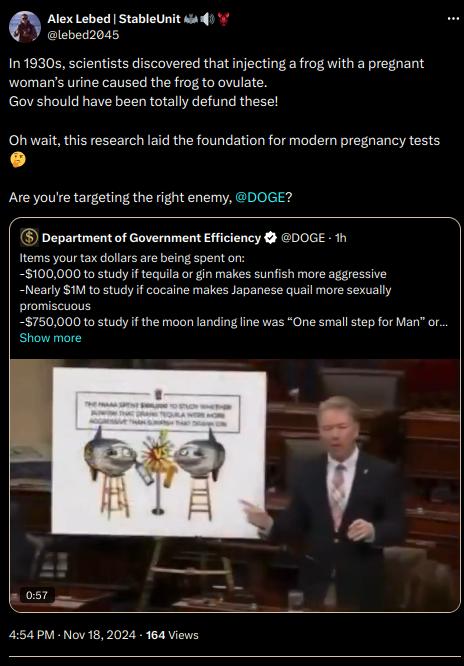this post was submitted on 18 Nov 2024
553 points (98.8% liked)
Science Memes
11086 readers
2702 users here now
Welcome to c/science_memes @ Mander.xyz!
A place for majestic STEMLORD peacocking, as well as memes about the realities of working in a lab.

Rules
- Don't throw mud. Behave like an intellectual and remember the human.
- Keep it rooted (on topic).
- No spam.
- Infographics welcome, get schooled.
This is a science community. We use the Dawkins definition of meme.
Research Committee
Other Mander Communities
Science and Research
Biology and Life Sciences
- [email protected]
- [email protected]
- [email protected]
- [email protected]
- [email protected]
- [email protected]
- [email protected]
- [email protected]
- [email protected]
- [email protected]
- [email protected]
- [email protected]
- [email protected]
- [email protected]
- [email protected]
- [email protected]
- [email protected]
- [email protected]
- [email protected]
- [email protected]
- [email protected]
- [email protected]
- [email protected]
- [email protected]
- !reptiles and [email protected]
Physical Sciences
- [email protected]
- [email protected]
- [email protected]
- [email protected]
- [email protected]
- [email protected]
- [email protected]
- [email protected]
- [email protected]
Humanities and Social Sciences
Practical and Applied Sciences
- !exercise-and [email protected]
- [email protected]
- !self [email protected]
- [email protected]
- [email protected]
- [email protected]
Memes
Miscellaneous
founded 2 years ago
MODERATORS
you are viewing a single comment's thread
view the rest of the comments
view the rest of the comments

The Moon landing line is a pretty important thing to study, actually, since we know what the rehearsed line was: "One small step for a man, one giant leap for mankind." Without that "a" it's a very silly line.
Armstrong for years claimed he said the line right and that it must've been garbled in the radio transmission, and in recent years has been vindicated as better signal:noise algorithms processed the recording and found the missing word. Researchers aren't blowing money to find out if Armstrong was a liar, they're using it to develop more sensitive receivers, better transmission protocols, and more advanced algorithms to parse signal out of noise, all of which have massive impacts in other domains. An algorithm that's better at parsing data out of noise in particular is going to be useful in loads of places like MRI machines where improving resolution will take billions in research but improving parsing is just updating the software.
That's exactly what I was wondering. Simple objective, very difficult problem, maybe have to invent new algorithms. Kind of like this: